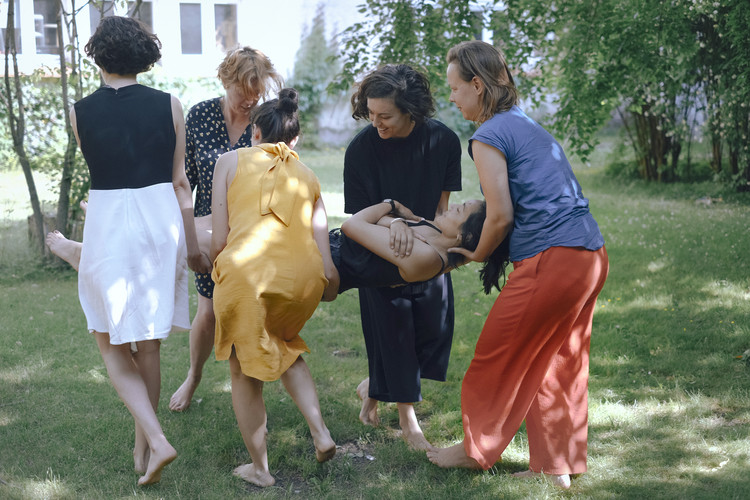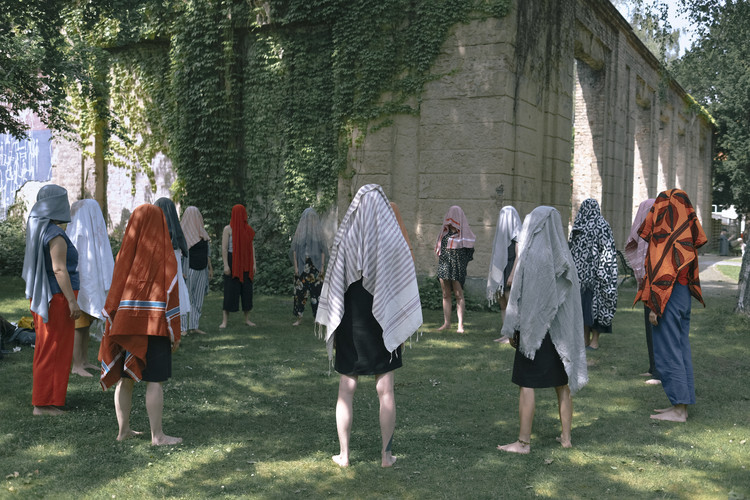What We Talk About When We Talk About Care
A Look Back at the FORMATS OF CARE Convening in Berlin
by Adela Lovric
FORMATS OF CARE was a twopart conference of feminist practitioners that took place in Vienna and Berlin in May and June 2019. Through a series of engagements inspired by feminist social practices and ethics of care, participants explored the prerequisites and possibilities of transforming formats into formats of care. A look back at the events in Berlin.
What makes a format a format of care? The twoday conference of the FORMATS OF CARE working group in Berlin started off with this core question formulated by Rosario Talevi. The curatorial team behind the project – Gilly Karjevsky, Elke Krasny, and Rosario Talevi – conceived FORMATS OF CARE based on their work around feminist care ethics and contemporary practices of care in art, architecture, urbanism, curating, and pedagogy. Their mission was to carve out more space for care in their own practices, and to illuminate the transformational strength of infusing care into everyday situations. Over the course of two intense days, the initial overarching question was broken into smaller discussion units, such as “what is a format”? and “how do we define care”? The questions sparked lively conversations coming from both personal and professional experience, interlaced with curated moments of focused collective engagement.
Day One: Foraging for Ingredients of Care
On the first day, the group gathered at Floating University – an experimental educational and event platform initiated by the architectural collective raumlaborberlin on the rainwater basin of the Tempelhofer Feld. This islandlike construction rises above the swampy area fringed with flora and fauna: frogs croaking, insects buzzing, and thick, humid air tricking its guests into feeling immersed deep in nature, away from the city, even if it’s only minutes away from a subway/underground (UBahn) station. There, in relaxing, beautifully organised isolation, the day started off with exploring the premises, finding comfortable spots, and enjoying carefully considered meal procedures.
Following the breakfast with a moment for selfintroduction, the group engaged in a silent conversation – a format developed by Gilly Karjevsky that served to level out uneven social dynamics and spark rapid interactions between participants. Two rounds of silent conversation were instigated – one to get to know each other, the other to jointly disentangle the term format. Each participant started by writing a comment on a sheet of paper. The papers were then repeatedly passed around and written on, until the round was completed. From the resulting textual collages, a vibrant discussion emerged. The group attempted to define basic elements of both format and care, and came up with diverse settings where the two coalesce.
“The term ‘care’ is the overarching umbrella which defines the mood and exchange conditions of a format. The idea that care is always domestic, gentle, kind, sweet, nurturing, motherly, is one idea of care, but within other systems, there are other modes of caring which don’t take the personality of the traditional nurturing mother.” – Jia Gu
As discussed, a format could potentially be a structure, a mode of organisation, a protocol, a script, a rule, a habit, a coming together, an exchange. It is openended and can be reformatted to allow space for something else. There are no formats without rules or instruments, but moments of care can soften their rigidity and allow for more spontaneity to emerge. Both format and care can be described as value systems. A format of care involves action, inclusion, interdependency, love, compassion, and self-compassion. Essentially, it is a process in which one is standing with another – being in adjacency. At its extreme, it can topple into hyperempathy and overdrive. Formats of care can be many things, including collective activities and inactivities, comfort breaks, moments of celebration, acts of repair, and each can be revisited in a caring way – a way of adjusting outdated dynamics, updating modes of production, phasingout processes which perpetuate norms we no longer wish to perpetuate, and so forth.
“A format of care is a safe space, which also means a space that can endure conflict.” – Carmen José
As proposed by Jia Gu, a format of care could also be a moment of conscious uncoupling or decollaborating in a professional relationship that is no longer functioning. Jia facilitated another round of discussions by presenting organisational stages of the Los Angelesbased project space Materials & Applications which she codirects. The participants had set out to recreate this type of structure within their own projects and point out opportunities for incorporating care. Moments such as decompression time, or celebration when something is successfully done, were identified as the beneficial soft spots in dense organisational schemes.
Finally, a format of care is a practice, not a service. According to feminist theorist Sheila Mullett, a person cannot truly care for someone if she or he is economically, socially, or psychologically forced to do so. (1) This perspective on the relation between labor conditions and care was brought up through the decision to self-organise meals during the project days. Instead of hiring catering service and having the work done invisibly in the background, the preparation of food was done by the group. The careinfused lunch time also allowed some downtime for moments of selfcare and care for the environment – for syncing with oneself and with the spatial configuration of the Floating University.
“Care is in the air, everywhere I look around.” – Unknown author
A special attention was given to the last meal and the final format – a performative dinner by Teresa Dillon. The dinner was preceded by Teresa’s reading and serving of roles which the participants could choose from the bowl of roles. Each role differently engaged with the idea of care: some participants were helping out in the kitchen, while others were sharing their personal moments of profound experience of care with each other, or quietly reflecting on the day.
Teresa’s dinner fittingly evoked Judy Chicago’s “The Dinner Party”, the legendary 1970s feminist art installation celebrating the richness of women’s heritage. Bringing the tools of the Parasitic Reading Room (a spontaneous set of reading spaces that took place along the venues of the 4th Istanbul Design Biennial) into FORMATS OF CARE, she took a selection of quotes from the Parasitic Reader and printed them on table mats, which were then read out loud at the thoughtfully decorated table. One of the quotes – by Joan Tronto, who is most known for exploring the intersections of care ethics, feminist theory, and political science – was particularly apt and nicely wrapped up the full day of discussing and practicing care: “Care provides a radically different way to look at moral and political life. Bernice Fisher and I defined care as a species activity that includes everything that we do to maintain, continue, and repair our world so that we can live in it as well as possible. That world includes our bodies, our selves, and our environment, all of which we seek to interweave in a complex, lifesustaining web.” (2)
Day Two: Sharing Collective Findings and Collectively Unwinding
After an exhausting, albeit deeply rewarding daylong foraging for ideas and connections amidst the swampy landscape of the Floating University, the group gathered again at another serene, natureadorned spot—the courtyard of the University of Arts—to resume the conversations on formats of care. The second part of the convening launched softly: the group rolled in gradually onto the blankets spread on the lawn of the innercourt garden and refuelled for the morning with coffee and cake. Teresa Dillon and Rosario Talevi delivered a recap of the main takeaways from the day before, and the group proceeded with new practicebased exercises.
The formats practiced together were partly planned, and partly an impromptu response to the immediate environment and the energy of the group. Valentina Karga shared her new textile art piece embedded with symbols through which she bridged the matriarchal history of the first Mediterranean communities in Europe, as well as the nonbinary thinking and union with all forms of otherness that was part of it. She also addressed the elements of care in producing and sharing an artwork: in this case, the choice of ecological materials, and the way in which she was sharing the artpiece with others for the first time.
The ideas brought up throughout the convening were once again reinforced in a series of relaxing collective moments, such as a group meditation facilitated by Rosario Talevi, a lunch picnic on the grass inviting oneonone conversations, and an afternoon siesta under a tree with public readings of excerpts from the book “Matters of Care” (2017) by María Puig de la Bellacasa. The slow paced setting and the sense of connectedness and mutual understanding in the group allowed for an unprompted, naturalflowing dissolution of the event. The moment of exchanging thankyous and goodbyes and the promise of continuation of mutual care it entailed was possibly yet another format of care, yet to be defined.
1 Rosemarie Tong. Feminist Thought, Student Economy Edition: A More Comprehensive Introduction. New York, Routledge, 2018. p. 171
2 Joan C. Tronto. Care as a Basis for Radical Political Judgements. Hypatia, Volume 10, No 2, Spring 1995. pp. 141–149.

